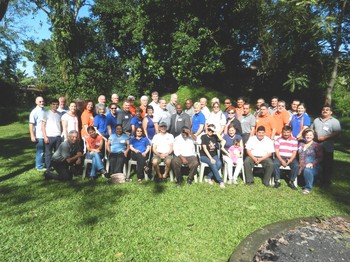Living Waters for the World (LWW) convened its first International Networks Conference here Oct. 28. Gathering at the Evangelical Presbyterian Seminary of the National Presbyterian Church of Guatemala, 47 representatives from 10 countries came together to share ideas and solve issues around access to clean water.
The gathering included five Presbyterian Church (U.S.A.) mission co-workers who assist LWW ― a ministry of the Synod of Living Waters ― in the countries they serve.
The conference theme was “Confluencia” ― variously translated as “coming together” like rivers, “convergence,” “conjunction,” or simply “meeting.” All of these meanings seem to fit as those gathered sought better ways to bring clean water to communities around the world.
Now in its 20th year of service, LWW installs clean water systems in communities in need around the world and has grown tremendously through the development of in-country networks that suppor both the American initiating partners and the locally based operating partners.
Each network, located in one of nine countries such as Honduras, Cuba, and Ghana, has been operating somewhat in isolation, celebrating successes and struggling to resolve challenges on their own.
About five years ago, now-retired LWW Director Wil Howie began to see that if networks could share best practices, they could solve some of these challenges together. “If we could pull them all together, we would be in a powerful position because everyone would be singing from the same hymnbook,” Howie remarked. It became a dream of his to see this conference materialize.
Beneficial relationships are developing. “You see a Nicaraguan in deep conversation with a Cuban. We are building relationships within the structure that haven’t existed before,” commented Howie. “These relationships will continue as new friends stay in touch over email and skype, after the conference concludes.”
All of this is deeply consistent with the mission of Living Waters for the World to provide clean water to communities in need. The goal has been accomplished over 20 years through the power of relationships.
Those relationships between initiating partners and operating partners have thrived because careful consideration has always been given to the expressed needs of communities and their ability to fully engage in the process.
For conference organizer Jeff Wagner, LWW’s director of operations, this deep connection between the participants is what he’d hoped for. “I’d like to see the networks understand their commonalities,” he commented.
For instance, Cuba is very different from Guatemala. Yet, their water systems may encounter very similar issues. Wagner hopes that in sharing best practices “a core set of components develops that can be shared with each network. Each network would then use those guidelines and refine them as they work best in their own context.”
For Guatemala coordinator Claudia Caballeros, the conference was been inspiring. As a team member serving in the host country, she found herself pleased to share the productive work of the Guatemala network, which has 123 working water systems.
Her understanding of Living Waters for the World has changed as a result of the conference. “Many times we focus on our own country but to see the work of these nine networks, their points of view and solutions has given me a more expansive understanding of Living Waters for the World itself,” she said.
The building of relationships is intimately connected to the building of water systems, Howie said. “It isn’t really about the water,” said Howie. “It’s about the people.”

